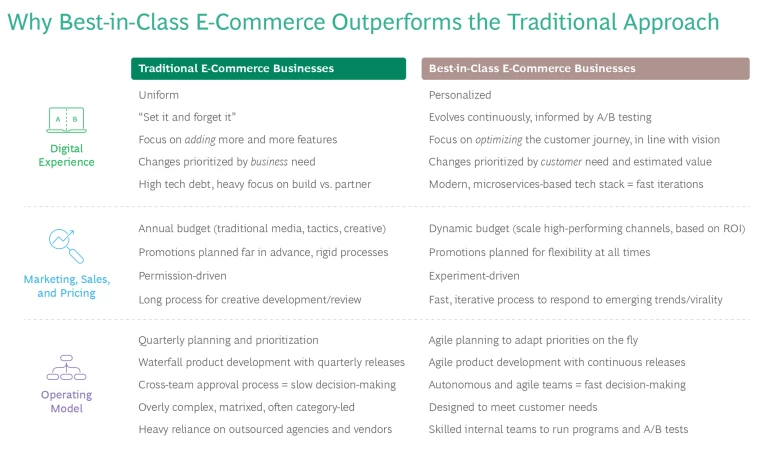Despite the struggles of many brick-and-mortar retailers to integrate online shopping into their omnichannel strategies, e-commerce will remain a significant source of growth in the coming years. These retailers can unlock even stronger growth rates when they view their e-commerce units as a distinct business, operating in some cases as a digital startup, rather than merely as an additional channel for their traditional business.
When a retailer’s e-commerce unit operates with the mindset of a startup, they experiment obsessively and take calculated risks in ways their brick-and-mortar operation does not. In our experience, these actions not only result in better online customer journeys and experiences, they also improve the e-commerce unit’s EBITDA by 15% to 30% in a single year through a mix of topline growth and cost savings.
Looking Beyond Retail’s Well-Oiled Machine
Great retailers are great operators that excel at running efficient brick-and-mortar businesses. They have built and fine-tuned playbooks to deliver consistency across their footprint and are generally good at “sweating the box” to deliver the right customer experience while maintaining strong financials. That approach, however, is in some ways antithetical to a nimble, high-growth e-commerce business—which by nature is in a constant state of evolution due to advances in technology, changes in customer needs and expectations, and competitive pressures.
The adoption of a startup mindset is often the key differentiator between a high-performing e-commerce operation and a bolt-on channel. A best-in-class e-commerce unit isn’t simply a leaner, more responsive version of brick-and-mortar retail; it is an entirely different business. (See exhibit.) Instead of adopting the more deliberate and rigid planning and decision-making processes of brick-and-mortar retailers, the best-in-class e-commerce businesses have fluid and dynamic processes that evolve through continuous testing. They prioritize personalization over uniformity and customer needs over business needs. They quickly scale ideas and tactics that prove their worth and scale back ones that underperform.

The Freedom of the Startup Mindset
A startup company in any industry puts strong emphasis on testing and learning, and then applies the resulting insights quickly to redirect ongoing investments, optimize the customer journey, and maximize ROI. E-commerce players with a startup mindset have the freedom to experiment, to fail, and to learn from those failures. The more hypotheses they test in response to market signals and customer needs, the more they improve the throughput of ideas, the quality of their experiments, the reliability and relevance of the insights, and the impact those experiments have. According to a recent study by the e-commerce experimentation company Optimizely, the median number of experiments run annually by a company is 34. To be considered in the top 10% of experimentation volume, a company needs to reach 200 experiments annually.
This is where the e-commerce units of traditional retailers can emulate leading direct-to-consumer or digitally native players, who have seen the significant upside of experimentation first-hand and consider its mastery to be table stakes. Airbnb has the capacity to conduct over 700 tests per week with its own tools and platforms. Microsoft, Amazon, and Google conduct thousands of experiments every year and have discovered that even small adjustments to their digital experience can have significant effects. Microsoft, for example, once estimated that it could increase revenue by as much as $80 million by changing the color of its hyperlinks on Bing from one shade of blue to another after a series of experiments demonstrated the impact of different colors on user behavior. A study by BCG and Shopify confirmed that seemingly small changes to the shopping experience can significantly impact an e-commerce seller’s business and customers.
Enhancing the Digital Experience and Marketing
Optimizing the digital experience for an e-commerce business means implementing changes prioritized by customer need and estimated value. One major specialty retailer pursued that goal by identifying 100 opportunities for improvement in its e-commerce operations and then testing them continuously over nine months. It scaled successful tests quickly, so that much of the incremental EBITDA improvement—estimated at around 30%—would accrue within the first year. Their most successful ideas included enhancing the guest-checkout option and highlighting how well certain products were selling to encourage users to add the product to their cart and convert.
By testing a higher number of ideas than a traditional business does, a retailer’s startup-minded e-commerce business can generate the objective, evidence-based insights it needs to understand not only how well its tactics are working, but also how valid its prevailing assumptions are. This enables the business to direct more resources to the most effective measures and tactics on its platforms, quickly scale back or eliminate ones that are not meeting targets, and discover new tactics worth scaling.
Experimentation also plays a vital role in the optimization of messaging and media, because it can provide the e-commerce unit with a sharper view of its return on marketing investments (ROMI). But the unit needs to conduct experiments carefully and understand precisely what effects are being measured. For example, testing 10 different brand creative options with a “let’s see what sticks” approach would be counterproductive and risk confusing customers. Instead, the unit could test different levels of marketing investment across geographic regions to find an optimal ROMI.
Building a brand is difficult and costly, which makes having a sharper view of ROMI important for e-commerce retailers. Driving brand awareness can be a challenge for any e-commerce company. This is one aspect where brick-and-mortar retailers have an advantage over online retailers, as their physical locations, in-person events, and prominent signage keep the brand top-of-mind for consumers. Because online retailers must actively generate brand awareness, they need to identify their best-performing channels at any given time in order to maximize the return on their marketing spend.
How the Startup Mindset Changes the Operating Model
Nurturing a startup mindset and a culture of experimentation requires a different set of enablers than an e-commerce business operated as an offshoot of a traditional retail business. Its operating model depends on having the right people and technology in place, agile ways of working, and incentives that encourage generating new insights.
Invest in the right people and technology.
Many traditional e-commerce r etailers are focused on day-to-day operations, which means they often lack the resources needed to respond to the rapid pace of digital change. This includes technology as well as talent. Best-in-class e-commerce retailers enhance their platforms and tools with leading technology to allow for feature expansion, quick updates, and sustainable scaling. They also succeed by “rebooting” their existing teams while blending in outside talent with experience in startups, agile ways of working, and experimentation.
Experiment to learn and improve quickly.
E-commerce retailers with a startup mindset view an agile experimentation framework as an essential success factor. In our experience, large, cross-functional teams can readily adopt the startup mindset and agile ways of working. Training plays a role, but the nature of the rapid test-and-learn process also accelerates the pace of adoption. While the process may seem intimidating at first, teams can usually find ways to add significant value to their business in a matter of weeks through experimentation. Team buy-in improves because the positive impacts of multiple experiments are quick and cumulative.
Reward risk-taking and lessons learned.
Incentives play a critical role in building a high-performing e-commerce business. Unlike traditional brick-and-mortar businesses—which incentivize “wins,” consistent performance, and achievement of the plan—a best-in-class e-commerce business should incentivize individuals and teams for the velocity and quality of the tests they launch and the learnings they generate. Moreover, failure should be celebrated, because a failed experiment still creates valuable insights that can help the business modify its approach. More often than not, the next version of an experiment that incorporates learnings from the failure will yield a positive outcome.
To reach its “north star” e-commerce goals, a retailer should think and act like a startup—with all the risk, experimentation, learning, and successes that entails. The adoption of a startup mindset allows a retailer to achieve its objectives faster and more efficiently by encouraging an obsessive, consumer-driven approach to experimentation. It also lays the foundation for the e-commerce unit to respond rapidly and confidently to future shifts in consumer behavior, competitive pressures, technological advancements, and other external factors. Without a commitment to a startup mindset, a retailer’s e-commerce business will leave money on the table and talent on the street as it falls further behind the best-in-class operations.











